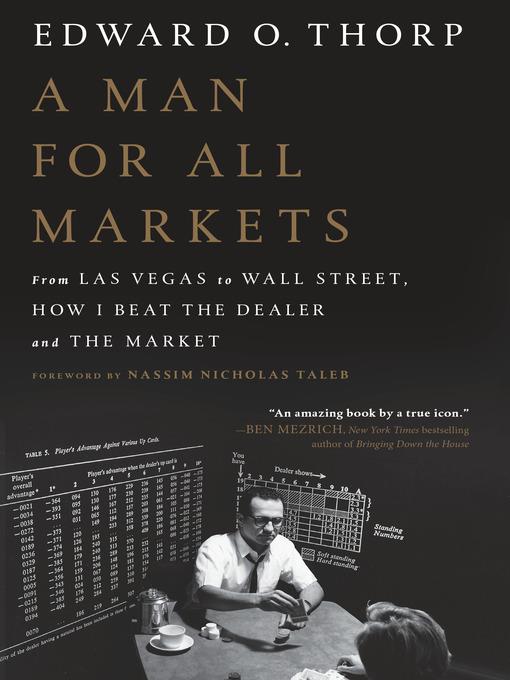
A Man for All Markets
From Las Vegas to Wall Street, How I Beat the Dealer and the Market
کتاب های مرتبط
- اطلاعات
- نقد و بررسی
- دیدگاه کاربران
نقد و بررسی

October 31, 2016
Thorp (Beat the Dealer), a mathematician, college professor, and millionaire hedge-fund manager, is perhaps best known as the inventor of a card-counting technique and primitive wearable computer that helped him win at the gambling tables in Las Vegas and flummox casino owners in the 1960s. His latest book, part memoir and part how-to investment guide, mashes up several narratives that don’t quite work together. The book is most engaging when Thorp uses his conversational style and penchant for evocative details to recount his life story, which begins with his childhood and precocious command of numbers in the 1940s and then his years as an impoverished college student in California. Along the way, Thorp complains about state laws that prohibited his gambling tactics, detects Bernie Madoff’s Ponzi scheme decades before its unmasking, rails against high-frequency stock market trading, and distances himself from legal troubles in his own hedge fund operations. The book is less successful when Thorp digresses into technical explanations of quantitative investment strategies, tutorials on basic accounting principles, and investment advice. In the end, Thorp seems to run out of original ideas, though his stated objective—to make readers “think differently about gambling, investments, risk, money management, wealth-building, and life”—is largely achieved.

December 1, 2016
You can't time the market, and you can't beat the house. Right? Wrong.What makes a good investor? To gauge from this amiable account by math whiz, professor, gambler, hedge fund manager, and investor Thorp (The Mathematics of Gambling, 1984, etc.)--one of the early "quants," as brokers call number nerds--much hinges on being curious and being willing to do the work necessary to satisfy that curiosity. In his case, there's also a contrarian streak at play; told, like all of us, that the winning odds are always with the casino and that there's no way to reliably play against the house, he took the scientific approach and tested the assertion. "I formed the habit of taking the result of pure thought--such as a formula for valuing warrants--and using it profitably," he writes. And did he ever. Blessed with a bent for understanding complex mathematics and being able to do sums in his head (a lost art, he assures us, that just about anyone can master), he first went to Las Vegas as a kind of validating experiment to confirm the suspicion that a deck of cards "that isn't well shuffled may have predictable patterns that can be exploited." Discovering those patterns is the rub, and Thorp's abilities outshine those of most mortals, which would seem to be true of his power to read a futures contract and a balance sheet. His account of making a broker blanch with a daring hedge maneuver during the height of the October 1987 crash is an exercise in learned derring-do, with the upshot that while the S&P dropped by a quarter, he at least broke even during the worst of it and gained in the long term. It's the kind of thing any would-be investor, to say nothing of casino cowboy, ought to read. Thorp's in-the-trenches account of gaming the system(s) is a pleasure--and instructive, too.
COPYRIGHT(2016) Kirkus Reviews, ALL RIGHTS RESERVED.

January 1, 2017
There is gambling, and then there is the sure thing. Somewhere in between lurks probability, chance, and risk. For Thorp (Beat the Dealer), identifying the probability of beating the house became a lifelong challenge. Here, he gives a biographical summation (think Richard Feynman's Surely You're Joking, Mr. Feynman!) of his quest to prove the aphorism "the house always wins" is flawed. While some rules (physics) are immutable, almost anything that is devised by humans has a weak point, be it gambling, insurance, or finance. The problem for Thorp, and everyone else, is that, once discovered, the rules can and will be altered. This may require changing strategy or finding new opportunity. For Thorp, this meant moving from card counting to hedge funds. As the author describes his efforts, it is easy to oversimplify. There is a lot of brain power at work and the application of high-level math skills. The lesson is that intelligence with diligence can overcome a disadvantage. VERDICT A mixed message--illuminating for the mathematically inclined, and cautionary for would-be gamblers and day traders.--Steven Silkunas, Fernandina Beach, FL
Copyright 2017 Library Journal, LLC Used with permission.

Starred review from November 15, 2016
Meet Edward Thorp: math professor, inventor, best-selling author, hedge-fund manager, gambler. And, if this autobiography is typical of his writing skill, a masterful storyteller. A math prodigy, Thorp was a ravenous student, learning as much about anything that interested him as he could, doing advanced math and conducting scientific experiments that were years beyond his chronological age. After earning his PhD in mathematics, he began a career as a university professor; at the same time, though, he was working on ways to create a scientific method of winning at blackjacknot out of avarice but because it was a challenge (although he did win large sums of money at the blackjack table). He has also made a lot of money in the stock and securities markets. He's the kind of guy you might expect to spend his autobiography telling us how awesome he is, and, while he isn't exactly modest, he comes across as an immensely likable man who figured out what he was good at and has spent his life doing it. Readers who like to read the life stories of ambitious, creative, and successful people with fascinating stories to tell should be steered in this book's direction.(Reprinted with permission of Booklist, copyright 2016, American Library Association.)

























دیدگاه کاربران